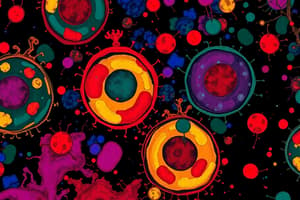Podcast
Questions and Answers
What are T lymphocytes described as in the content overview?
What are T lymphocytes described as in the content overview?
- The main components of Canvas learning
- The cornerstone of adaptive immune responses (correct)
- The main focus of office hours
- The primary source of written materials
Which cells respond to MHC-restricted antigen presentation?
Which cells respond to MHC-restricted antigen presentation?
- CD8 lymphocytes with MHC-II requirement
- CD8 lymphocytes with MHC-I requirement
- CD4 lymphocytes with MHC-II requirement (correct)
- CD4 lymphocytes with MHC-I requirement
What is the difference between α:ß T lymphocytes & γ:δ T lymphocytes?
What is the difference between α:ß T lymphocytes & γ:δ T lymphocytes?
- Their development and functions (correct)
- Their location in the body
- Their response to MHC-restricted antigen presentation
- Their sensitivity to cytokines
What is the role of the thymus in the life cycle of α:ß T lymphocytes?
What is the role of the thymus in the life cycle of α:ß T lymphocytes?
What is the purpose of positive and negative selection?
What is the purpose of positive and negative selection?
Which cells are involved in central tolerance?
Which cells are involved in central tolerance?
What is the significance of understanding T cell early development?
What is the significance of understanding T cell early development?
What are the learning objectives related to MHC-restriction and T cell receptor (TCR) engagement?
What are the learning objectives related to MHC-restriction and T cell receptor (TCR) engagement?
What is the primary focus of the section on innate immunity, cytokines, and inflammation?
What is the primary focus of the section on innate immunity, cytokines, and inflammation?
What is the function of professional antigen-presenting cells?
What is the function of professional antigen-presenting cells?
Study Notes
T Lymphocytes Overview
- T lymphocytes are described as a type of immune cell that plays a central role in cell-mediated immunity.
Antigen Presentation
- T lymphocytes respond to MHC-restricted antigen presentation, meaning they recognize and respond to antigens displayed on the surface of antigen-presenting cells.
T Lymphocyte Subtypes
- α:ß T lymphocytes and γ:δ T lymphocytes are two subtypes of T lymphocytes, differing in their T cell receptors and functions.
Thymus and T Lymphocyte Development
- The thymus is essential for the development and maturation of α:ß T lymphocytes, where they undergo positive and negative selection.
Tolerance and Selection
- Positive selection ensures that T cells recognize self-MHC molecules, while negative selection eliminates autoreactive T cells, promoting central tolerance.
- Immature T cells that undergo negative selection are eliminated, preventing autoimmune responses.
Importance of T Cell Development
- Understanding T cell early development is crucial, as defects in this process can lead to immunodeficiencies or autoimmune disorders.
MHC-Restriction and TCR Engagement
- Learning objectives related to MHC-restriction and T cell receptor (TCR) engagement include understanding the mechanisms of antigen presentation and TCR-ligand interaction.
Innate Immunity and Cytokines
- The primary focus of the section on innate immunity, cytokines, and inflammation is to understand the first line of defense against pathogens and the roles of cytokines in modulating the immune response.
Antigen-Presenting Cells
- Professional antigen-presenting cells, such as dendritic cells, process and present antigens to T lymphocytes, initiating an adaptive immune response.
Studying That Suits You
Use AI to generate personalized quizzes and flashcards to suit your learning preferences.
Description
Test your knowledge on T Lymphocyte Development from the Fusion Session workshop. This quiz covers the purpose and suggested process of Fusion Sessions as well as the content related to T Lymphocyte Development.




